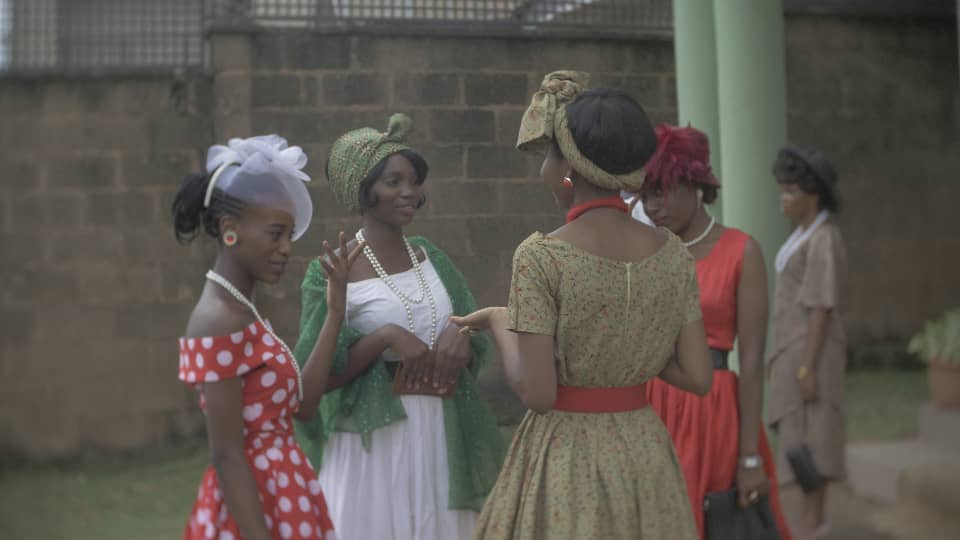How Senior Girls Navigate a Patriarchal Society; thoughts On Glamour Girls by Dika Ofoma
Written and Produced in 1994 by Kenneth Nnebue and directed by Chika Onukwufor, Glamour Girls tells the story of a group of independent and sophisticated women in their mid-lives who are powerful through their relations with older, rich and influential men. We meet Sandra (Jennifer Okere) who is introduced into the big leagues by Doris (Gloria Anozie), a friend from the university. In their first meeting after school, Doris inquires how life has been since graduation. Sandra responds, miserable, echoing the feelings of a number of independent women who have sought to make good use of their education and degree. She laments about the patriarchal society they live in that has made job hunting an avenue for men to exert and flex their muscles. She says, “Every man wants to sleep with you before they listen to you”. What is worse is that after a woman has committed to this injustice, the said job is not even guaranteed. About Marriage, Sandra cries that she’s no longer of marriageable age. In her stint with relationships, she’s played the role of the placating biblical virtuous woman who cooks and clean, only for the men to abandon her and settle with younger women. It is however paradoxical that after Doris has shared with Sandra, her secret of navigating this patriarchal world- bedding older men for the fiscal benefits, her response is, ” Who will marry you after all these?” Doris rebuffs her, “Marriage is no longer the prime issue in a woman’s life?” Reminding her that with wealth, even a husband is a commodity that can easily be purchased. Sandra becomes a ‘Senior Girl’ when she’s introduced to a certain Chief Esiri (Pete Bruno) whom through his influence and wealth finds her a good job and furnishes a duplex for her. But she soon finds love in a younger man, Dennis (Pat Attah), and in the way love makes people do foolish things, she jilts Chief Esiri and gives up her savings to help sponsor Dennis abroad, only to discover that she’s been swindled. With the women, it is all about appearances. Thelma, Ngozi Ezeonu’s character, validates this. She receives a salary, an allowance from a fiancé abroad and a father in-law to be who caters for her bills, yet she has older men on the side for back up. Life in Lagos is hard and there’s a standard of living expected of senior girls that her regular income and the other “stipends” she receives from fiancé and father in-law cannot afford. In fact, she refers to her foray with older men as a double assurance. It is her being prudent as she cannot vouch that her fiancé abroad would remain faithful to her. Why then lay all her eggs in a basket? Doris is the more experienced senior girl and she navigates patriarchy better: getting married to her boy-toy, Daniel ( Ernest Obi ) while still maintaining her relationships with the Alhaji and Chief who pay her bills. She flips the script on societal expectations of a married woman, being the breadwinner while her husband cooks and cleans. And it is indeed shocking and maybe pleasing that no comeuppance awaits her in the end. And so what her story serves is an eye-opener to the injustice in the institution of matrimony that insists that a woman stay submissive as the husband leads. And then there’s a subplot about a Helen ( Barbara Odoh), whose story as a professional sex worker who employs blackmail and lies to expand her trade does not connect to the central plot. I however find her to be the most interesting character as she carries herself and her job with the prestige and dignity it deserves. She insists on a condom and twice in the film, she makes a case for being called a harlot. Her story also brings to light, the dubiousness of misogyny. A certain Jake calls for her services and agrees to pay her 2000 naira for the night, only for him to attempt to waylay her by also sending in his friend, Bally (Keppy Ekpeyoung) in the middle of the night for him to also sleep with her. It turns out that this friend is indeed her brother. This is the furthest this story goes but what this shows is the way men only think that in matters of women, only family, mother and sister, are deserving of honour. We wrap up with the story of Jane (Liz Benson) who having lived a rough life ( appears to be frolicking with older men too) in the past, leading to the birth of a child out of wedlock, finds a man- Desmond (Sola Fusodo)- willing to marry her, despite this or for this. All is well until Desmond survives a fatal accident that leaves him bedridden and she meets a certain Alex with a phony British accent. She divorces Desmond for this Alex and he swindles her of her entire existence. When she becomes aware that she’s been duped, a lucky call leads to a tête-á-tête with him in a hotel room where she shoots him and is thus, arrested. It is interesting the way these women’s lives juxtapose each other. We see that with the women who insist and refuse to submit to the control of men and patriarchy, their lives go on as it were or even better. Doris for instance remains happily married to her “boy-toy’ husband who cooks and cleans for her. But for the gullible ones- Sandra and Jane, who let themselves be swooned by sweet talk and do not arm themselves against the meandering ways of men, they meet a waterloo. They are both left heartbroken and duped; one gets sent back to penury, the other is arrested for murder.


